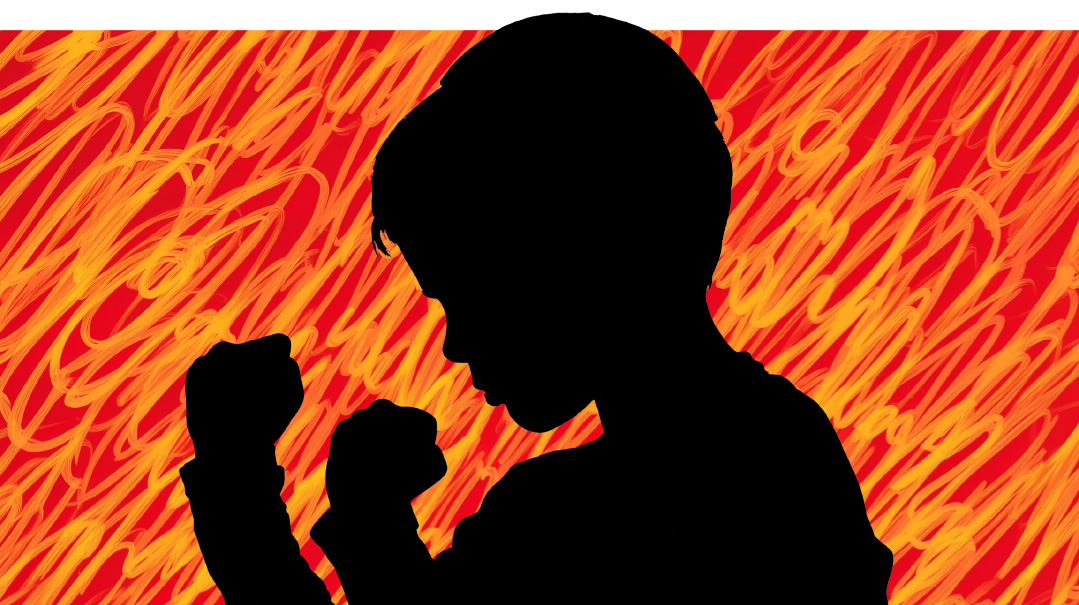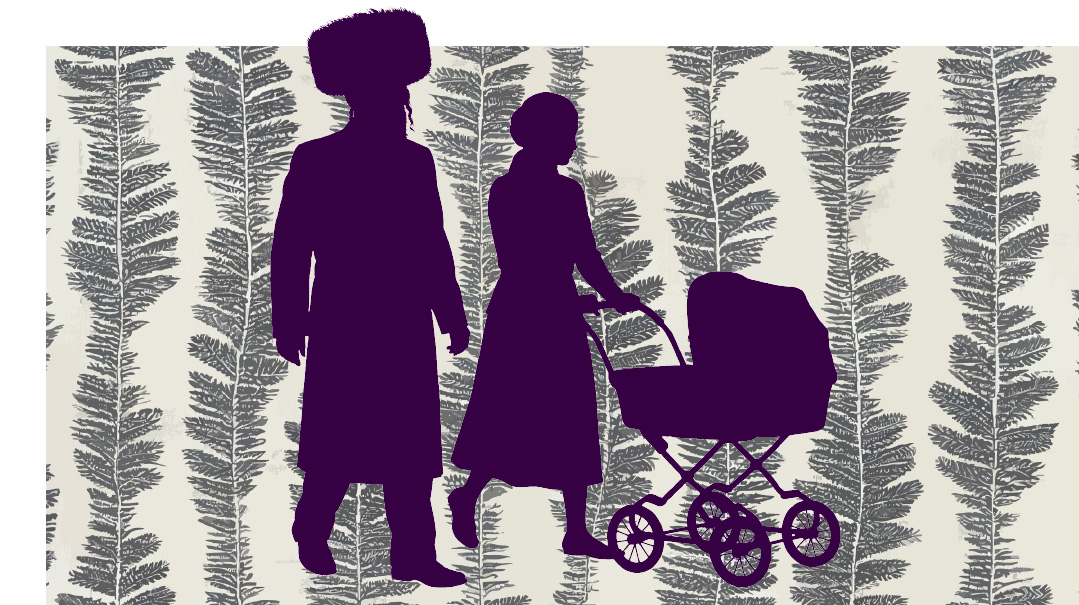Other-Derech Children
| July 22, 2020My children never rebelled, they just wiggled out of my grasp

I always dreamed of the day when all my boys would be old enough to sit around my Shabbos table and, together with a sprinkling of sons-in-law, make up a minyan. The zemiros would be multifaceted; the low, rich harmonies supporting the foundation, the higher harmonies teasing my soul upward for a few precious moments.
Shalosh seudos would stretch just a little too late, and they’d make an impromptu minyan for Maariv, right there in my living room. But long before my youngest son’s bar mitzvah, that dream slowly drifted away, carried downstream in a quiet river of salty tears.
I’m a fairly typical chareidi mom. Large family, frum neighborhood, the right schools and yeshivos and all that. While my kids were young I worked part-time, mostly from home. I played with my kids and told them stories and sang them songs. I was involved and invested and present.
Oh, I’m far from perfect. I was always afraid of outside influences, so I was too tight with my kids. I didn’t let them play in just anyone’s house, I didn’t allow electronic devices even though most of their friends used them, and we didn’t use certain hechsherim. I thought that controlling all of these aspects gave us a better chance of raising solid, healthy kids.
But my fears pushed me to push them. I often reacted too harshly, and my concern brought about many power struggles. My children never outright rebelled. But slowly, one after another, I saw them wiggle out of my grasp and find quicker, easier means of finding acceptance.
They stretched the boundaries until the line moved, almost imperceptibly. There were no “big” events, no flag-burning moments. There was my son coming home singing a non-Jewish song he said he’d heard on the bus home. The dangling earrings my daughter borrowed from her classmate. The talk around the Shabbos table about celebrities I’d never heard of. No one jumped off a cliff; they just waded into water that got deeper and deeper. And one child seemed to pave the way for the next.
The more they tested the waters, the tighter I tried to hold them back, and the more they vied for individuality.
I went through some periods of despair. I felt like a failure for having kids so different from what I’d worked so hard for. I took parenting classes. I went for therapy. And, of course, I davened and davened.
It took me time, and a lot of inner growth, to realize that being different is not necessarily a bad thing.
I had to come to terms with the truth: We do not have control over our children. We can force their actions while they are young, but that ability dwindles with time; and the more we force, the more they will rebound in the opposite direction.
Repeated requests to my daughter to keep her hair pulled back led to her frequently “losing” her ponytail holders. Demanding too many details about my son’s whereabouts resulted in him “forgetting” to check in. The examples are endless. Each situation, on its own, seemed innocuous. Yet I felt as if I was standing at the top of a tall staircase, watching a slinky slither down toward the bottom with no one there to catch it when the last bounce was over.
How do I deal with the mistakes I made? I take responsibility for those mistakes and work on not repeating them with my younger children. I also remember that I had to make mistakes; it’s part of the system. If Hashem wanted my children to have perfect parents, He could’ve arranged that! He didn’t, so it follows that my mistakes did not cause my children to have a different derech. They chose their derech.
Guilt is not a useful emotion. It pulls us down, mires us in the negative, sucks away our energy. When I start to doubt that I did — and continue to do — my best, I ask for a reality check from someone I trust.
Like in any area, I do my hishtadlus, and the results are up to Hashem. I daven that each of my kids should develop a true, deep, meaningful connection with Hashem, and that they each influence each other positively. I no longer have a set, detailed agenda, nor do I daven that they adhere to a specific dress code.
Today I see my kids through different glasses. They are not “less than.” They are not bad. They are not wrong. They have to find their way to Hashem just like I did, like I do, every single day.
Sure, they could be puppets who just do what they are told. But they’re not. They’re individuals. With their own values and their own flavor. And me? I’m the mom who helped them turn into real people.
Sometimes I wish I could say:
When I get a once-over from young moms who see me walking with my other-derech kids, I want to tell them, “Wait. Just wait until your kids are older. Wait until they start making their own decisions, carving out their own lives and futures. Then you’ll understand how challenging it is to raise teenagers today.”
Jaw-dropper:
My son was asked to daven elsewhere when he entered the shul we’ve davened in for 20 years, because he was dressed “inappropriately.”
Don’t:
Don’t give unasked-for advice. It’s probably wrong.
Don’t fish for information (not from me and certainly not from my other kids!). Don’t give knowing looks. Allow people their privacy and their dignity.
Don’t be afraid of those who are different. There’s no disease you’ll catch by standing in close proximity to a kid in cutoff jeans! If you’re afraid, daven for acceptance and compassion.
Don’t tell your children to steer clear of mine. If you don’t want your child in my house, that’s your prerogative, and you might even be right. But they’ll see each other outside, they might socialize. Instead of policing your child’s relationships, offer strategies on sticking to values, resisting peer pressure, dealing with temptations and emotional upheavals. Empower them with your trust. You can disapprove behaviors, but don’t relay the message that there are second-class Jews.
Don’t stare. All children are hungry for acceptance. If they sense your strong disapproval, they’ll further distance themselves from people like you. You don’t want to be the one who pushes the kid who’s on the edge off the ledge.
Don’t assume we’re a dysfunctional family, or that there was trauma or child abuse. Don’t assume we didn’t set boundaries, that we were too liberal, or too strict. Don’t try to figure out where we went wrong. Don’t make any assumptions at all, other than we’re still doing our best.
Do:
Make my child feel accepted, without assuming he’s ignorant or defiant. Treat him with the respect you’d treat a newbie to Yiddishkeit, and assume he’s trying to grow.
Daven for my children along with yours and the rest of Klal Yisrael.
Remember that it’s really hard to be a kid today, with the endless distractions and temptations. When you see my child struggling externally, it’s because she’s struggling internally.
If you have other-derech children:
Don’t assume your struggles are exactly the same as others with nonstandard kids, or that what works for you is the solution for them.
Don’t pretend to your other children that nothing is wrong. The fear of not knowing the real story is far more frightening — and damaging — than the truth. Empower your children by being honest with them, sharing an age-appropriate way of viewing their behavior. You can also share your disapproval of their siblings’ actions, while making it clear that it’s the actions you disapprove of, not the child himself.
(Originally featured in Family First, Issue 702)
Oops! We could not locate your form.








Comments (1)